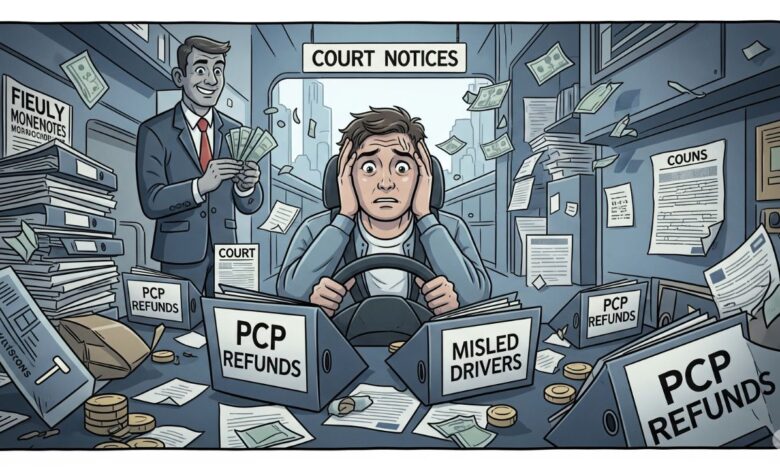PCP Refunds and Real-Life Drama: The Car Finance Scandal Unfolding in the UK

Car finance has long been seen as a convenient way for drivers to access the latest vehicles without the burden of an upfront payment. But in recent years, what appeared to be a standard financial tool has unravelled into one of the most talked-about consumer rights issues in the UK. A growing number of drivers are discovering that they may have been misled — and they’re now coming forward to demand accountability and justice.
This is not just a financial story. It’s a real-life drama affecting families, commuters, and young drivers alike. It’s about everyday people who trusted the system and are now asking difficult questions about what they signed, what they were told, and what they might be owed.
What Is PCP and Why Does It Matter?
PCP, or Personal Contract Purchase, is one of the most common types of car finance agreements in the UK. It allows consumers to make lower monthly payments over a fixed term, after which they have the choice to:
- Return the vehicle,
- Make a final ‘balloon’ payment to own it, or
- Use any remaining value as a deposit on a new contract.
For many drivers, this flexibility made PCP attractive. However, it’s the details hidden in the fine print — and in some cases, never disclosed at all — that have led to growing concern. Misleading sales tactics, undisclosed commission arrangements, and inflated interest rates are just a few examples of why PCP agreements are now under intense scrutiny.
Behind the Scenes: How the Scandal Took Shape
The core of the issue lies in how these finance deals were explained — or not explained — to consumers. In many cases, buyers were not told that the salesperson received a commission from the lender, which could have influenced the interest rate they were offered. Others weren’t properly informed of their end-of-contract obligations, penalties, or what would happen if they exceeded the mileage limit.
From 2007 to 2021, a large number of these agreements were signed under practices now being questioned for fairness and transparency. This has led to the rise of the PCP claim — a formal process where consumers challenge the validity of their agreements and seek redress for unfair terms.
How to Tell If You’ve Been Affected
If you’re unsure whether your car finance agreement was mis-sold, you’re not alone. Many people signed deals years ago and are only now discovering potential issues. Here are some red flags to look out for:
- You weren’t told about any commissions or incentives received by the dealer.
- The interest rate seemed unusually high without explanation.
- You felt pressured to sign the deal without having time to consider alternatives.
- You didn’t fully understand the financial implications of your monthly payments or balloon payment.
- Your salesperson glossed over the long-term costs or end-of-contract options.
If any of these sound familiar, it may be worth investigating whether you’re eligible to file a PCP claim.
The Real-Life Impact: Stories from the Ground
What makes this scandal so significant is that it affects people from all walks of life. For one driver, the PCP deal offered a seemingly affordable way to drive to work every day. For another, it meant they could provide a safe and reliable car for their growing family. But when the hidden costs surfaced or they struggled to meet the balloon payment, the impact was more than just financial — it was emotional.
Drivers have reported:
- Feeling trapped in long contracts with little flexibility.
- Being caught off guard by excessive end-of-term charges.
- Discovering they paid far more over time than the car was ever worth.
This widespread sense of betrayal has fuelled public outrage and a growing movement of consumers demanding better transparency in vehicle finance.
Taking Action: What to Do If You Suspect Mis-Selling
You don’t need to be a legal expert to stand up for your rights. If you suspect your finance deal was unfair or misleading, here’s what you can do:
- Review your agreement: Go back over your paperwork and note any unclear or missing information.
- Recall your experience: Write down what you remember about the sales process — especially anything that felt rushed or confusing.
- Compare offers: If you were given no other options or details were withheld, that could be a warning sign.
- Seek advice: Consider speaking to a specialist who can guide you through the process of making a claim.
The important thing is not to assume that nothing can be done. A PCP claim may give you a way to challenge the agreement and recover costs that should never have been imposed in the first place.
Why This Matters for the Future
The growing wave of PCP claims is not just about individual cases. It’s also sending a clear message to the finance industry: consumers are paying attention. Transparency is no longer optional. If providers want to earn public trust, they must explain terms clearly, disclose commissions, and ensure buyers understand what they’re signing.
This shift isn’t just reactive — it’s preventative. By challenging past agreements, consumers are shaping a more accountable future for financial products, where clarity replaces confusion and fairness replaces profit-driven complexity.
Final Thoughts: Awareness Is Your Best Asset
If you’re a driver in the UK, especially one who signed a car finance agreement between 2007 and 2021, now is the time to examine it closely. The real-life stories emerging from this scandal highlight just how many people were sold deals that didn’t serve their best interests.
Stay informed. Ask questions. And don’t hesitate to take action if something doesn’t seem right.
The car finance industry is being held to a new standard — and everyday motorists are the reason why. Through each PCP car finance claim, the movement for fairness and transparency grows stronger, giving power back to the people it should have served from the beginning.
Also Read: Justin Billingsley Greene Law: A Comprehensive Guide to Legal Excellence in Connecticut



